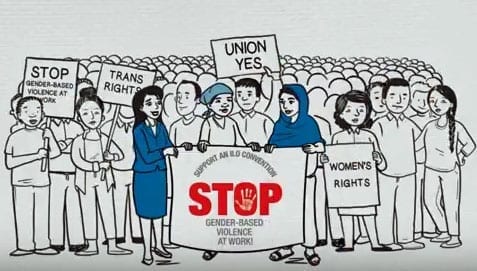A global regulation addressing gender-based violence at work is one step closer to reality following a 10-day meeting of workers, their unions and representatives from business and government—but much work must yet be done to ensure its passage.
Participants at the recent International Labor Organization (ILO) conference in Geneva, Switzerland, reached consensus on the need for a convention and recommendation to provide guidance to member states, employers and unions in implementing a global standard to end violence and harassment at work. ILO conventions are legally binding international treaties that may be ratified by member states, and recommendations serve as non-binding guidelines.
Momentum for an ILO convention covering gender-based violence at work follows years of advocacy by the global union movement, an effort led by the International Trade Union Confederation (ITUC).
Leading up to the most recent negotiations, Solidarity Center partners urged their unions, governments and employers to publicly support a binding ILO convention on violence and harassment at work that includes gender-based violence. Their efforts clearly moved countries such as the governments of Tunisia and Cambodia, which both indicated strong support.
With Solidarity Center support, more than a dozen workers—from Brazil, Cambodia, The Gambia, Guatemala, Honduras, Indonesia, Kenya, Mexico, Morocco, Nigeria, Palestine, South Africa, Swaziland, Tunisia and Zimbabwe—participated in the conference. Several took lead roles in the negotiations as part of the workers’ group, including sisters from Kenya and Zimbabwe who ensured gender-based violence remained the focus of discussions.
Violence and Harassment at Work Violates Basic Human Rights
The discussion included defining violence and harassment and assessing whether the final outcome should be a binding convention and a recommendation or only a recommendation.
Marie Clarke Walker, secretary-treasurer of the Canadian Labour Congress, represented the workers’ group. In committee negotiations among workers, employers and government representatives, Walker stated that violence and harassment at work constitutes a serious human rights violation, one that is incompatible with decent work, and one that impinges on the ability to exercise other fundamental labor rights.
Violence and harassment at work affect all occupations and sectors of the economy, including formal and informal work settings, Clark said. She also linked the importance of the negotiations to the current moment, including the #Metoo movement which has demonstrated the prevalence of violence and harassment at work and how it is both tolerated and endured, including by an especially high percentage of women seeking to obtain or maintain employment.
Walker also noted that while violence and harassment affects everyone at work, not everyone is affected in the same way nor on the same scale. Specifically, women and gender nonconforming people experience violence and harassment in disproportionate numbers, underlying the need for the gender dimensions of violence and harassment to be addressed in the instruments.
Countries Confirm Support for GBV at Work Convention
Representatives of several country members, including the European Union and its member states, confirmed their support for development of an effective ILO convention and emphasized that it must promote a gender-responsive approach, focus on prevention and enforcement measures, and improve protections for victims from intimidation and further assault.
The governments of African countries and Mexico also expressed support for a convention and recommendation. Speaking on behalf of the Africa group, the government of Uganda said a convention would leave no doubt about the international community’s commitment to influence domestic legislation.
Mexico’s representative observed that while both women and men were subject to harassment in the workplace, women were experiencing a higher vulnerability due to unfavorable labor market conditions. Further, international legal instruments should seek a general empowerment of women in the workplace, including with regard to sustainable development.
Employers do not want to see violence and harassment in the workplace, said Alana Matheson, the employer’s representative and deputy director of Workplace Relations at the Australian Chamber of Commerce and Industry. Matheson noted that everyone has responsibilities for preventing violence and harassment as well as a right to work in an environment free from violence and harassment.
With the ILO’s final negotiations set for June 2019, workers, unions and our allies will be looking to build on the successes of this year’s committee meeting and negotiations to ensure the strong support by employers, member countries and workers for the need to prevent and address violence and harassment at work results in an inclusive convention and recommendation.
The final convention and recommendation must include a broad definition of violence and harassment, one that includes gender-based violence and an inclusive definition of worker and work where employers, member states and unions share obligations and responsibilities to prevent and address violence and harassment.
Robin Runge, Solidarity Center senior gender specialist, participated in the ILO conference.

